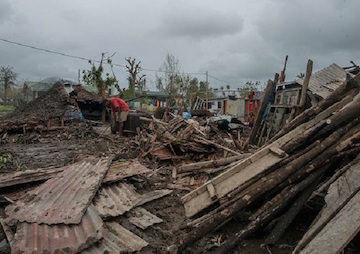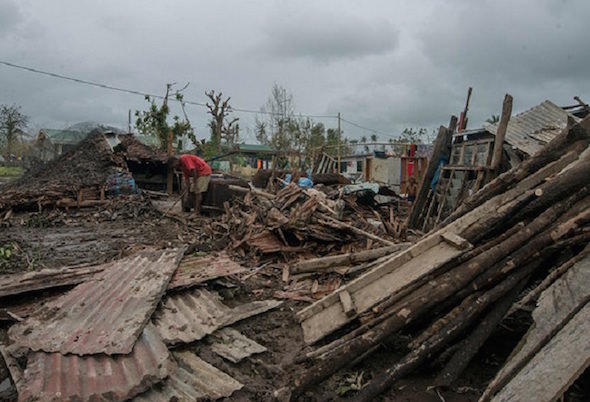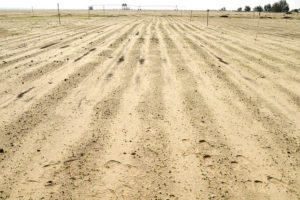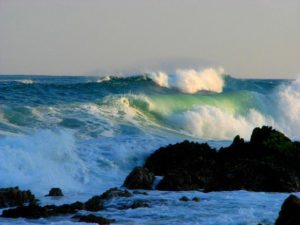Rich Nations Urged to Cut Temperature Rise Targets
A senior scientist at Pennsylvania State University's Earth and Environmental Systems Institute says voices of poorer nations must be heard in the political tussle over reducing the “utterly inadequate” global warming limit.
By Tim Radford, Climate News Network

Assessing the devastation inflicted on a village in Vanuatu by Cyclone Pam. (UNICEF Pacific via Flickr)
This Creative Commons-licensed piece first appeared at Climate News Network.
LONDON — The official target of limiting global warming to a 2 degrees C rise has been described by a senior scientist as “utterly inadequate” to protect the people most at risk from climate change.
That’s the conclusion reached by one of the authors of the recent Intergovernmental Panel on Climate Change (IPCC) assessment report, in an analysis of the political tussle between rich and poor nations at last December’s UN conference on limiting temperature rise.
Richer countries were happy to limit global average temperature rises to 2 degrees C, while middle and low-income nations would have preferred to contain warming within 1.5 degrees C or lower.
Possibilities of calamity
But Dr Petra Tschakert, associate professor at Pennsylvania State University’s Earth and Environmental Systems Institute, reports in the journal Climate Change Responses that the agreed limit contains within it the possibilities of calamity for many people.
“The consensus that transpired during this [UN conference] session was that a degree C danger level seemed utterly inadequate, given the already observed impacts on ecosystems, food, livelihoods and sustainable development,” Dr Tschakert says.
“A low temperature target is the best bet to prevent severe, pervasive and potentially irreversible impacts, while allowing ecosystems to adapt naturally, ensuring food production and security, and enabling economic development to proceed in a sustainable manner.”
Her analysis is not of itself new, nor is it much disputed — other leading scientists have also warned that such an international agreed limit could be disastrous.
But her commentary in the journal reveals something of the debate among the government representatives and experts who must meet and prepare for global action.
Global average temperatures have been creeping up at fractions of a degree per decade for more than 30 years, and some degree of further global warming is now inevitable.
Scientists at the IPCC have from the start warned that — without steps to dramatically reduce the combustion of fossil fuels — the planet could warm by 4 degrees C or more, and sea levels could rise by up to a metre by 2100. In 2009, governments met in Copenhagen and settled on a limit of 2 degrees C.
“This should happen now,
and not only when climate change hits the rich world”
But this target has always been contested. More than 100 poorer nations and small island states — such as Tuvalu, recently pounded by a tropical cyclone Pam — have repeatedly said that a 2 degrees C rise is unsafe, and called for a 1.5 degreesC limit.
The World Health Organisation argued at the December UN meeting that, as far as human health was concerned, there was no safe limit, and people already faced hazards from undernourishment, and from food and water-borne infections.
Heatwaves, such as the one that hit Russia in 2010, may have caused 10,000 additional deaths, while floods, hurricanes and other extreme weather events are likely to be more frequent and more severe hazards in a 2 degrees C world.
Climate impacts
Dr Tschakert’s argument is that a global average limit may be a convenient and compelling instrument for discussing climate change impacts, but nobody in the world actually faces a global average.
Such a notional limit is the average of extremes and variation across regions, all of which are subject to different hazards — ranging from glacial melting to coral bleaching — that could be disastrous for people in those regions, many of whom are among the world’s poorest.
Dr Tschakert says: “These implications emphasise what is truly at stake — not a scientific bickering of what the most appropriate temperature target ought to be, but a commitment to protect the most vulnerable and at-risk populations and ecosystems, as well as the willingness to pay for abatement and compensation..
“This should happen now, and not only when climate change hits the rich world.”
Your support matters…Independent journalism is under threat and overshadowed by heavily funded mainstream media.
You can help level the playing field. Become a member.
Your tax-deductible contribution keeps us digging beneath the headlines to give you thought-provoking, investigative reporting and analysis that unearths what's really happening- without compromise.
Give today to support our courageous, independent journalists.






You need to be a supporter to comment.
There are currently no responses to this article.
Be the first to respond.